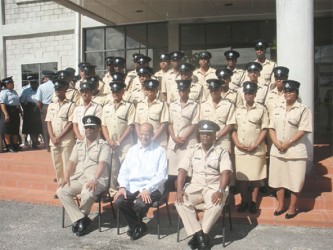The Guyana Police Force (GPF) yesterday concluded three training programmes intended to advance its modernisation efforts in the areas of management and prosecutions.
A simple ceremony at the GPF Officers’ Training Centre yesterday marked the end of the Junior Officers’ Course No 24, the Station Management Course No 1/2013 and the Elementary Prosecutors’ Course No 1/2013 and the participants were urged to ensure their training is reflected in their job performances.
In total, 71 participants, drawn from the GPF, the Guyana Prison Service (GPS), Guyana Fire Service (GFS), the Guyana Geology and Mines Commission (GGMC), and the City Constabulary (CC) graduated from the programmes, which were hosted under the theme ‘Advancing Institutional Modernisation to Secure Our Communities through Enhanced Professionalism, Partnership, Strategic Management and Effective Leadership’.

There were 28 participants in the Junior Officer’s Course, which covered subjects that ranged from Use of English to Professional Ethics and also addressed Conflict Resolution, Strategic Management and Human Resource Function within the participating organisations. There were 25 participants in the Station Management Course, who benefited from training in Report Writing and Managerial Performance, among other areas. The Elementary Prosecutors’ Course had 18 participants and placed emphasis on training new prosecutors, in particular, about the requirements of a prosecutor.
Home Affairs Minister Clement Rohee, who spoke at the closing ceremony, noted that the programmes were aimed at the capacity building of the GPF. “They are all consistent with the objectives of the modernisation process of the organisation,” he said.
The minister pointed out that two of the three courses—The Junior Officers’ and Elementary Prosecu-tors’ courses—attracted participants from outside the GPF. “I think that this is a healthy development …,”he opined, before encouraging the force’s administration to continue in this direction.
While noting the changes in the society and the challenges that they present to the GPF, Rohee emphasised that the GPF cannot be left behind and urged it to respond in a positive way, to raise the level of policing and to pursue 21st century police strategies.
The Junior Officers’ Course, which drew participation from Assistant Superintendents, Cadet Officers, and Inspectors, was aimed at providing the opportunity for them to be more “versed” in executing their duties, the minister noted, while adding that the participants went prepared to assume higher positions.
The Station Manage-ment Course, which drew participation from Sergeants and Corporals, was seen as an important training opportunity for participants. “The ability of the Guyana Police Force to serve the needs of our communities depends on a large extent on the quality of management at police stations,” Rohee said. “If good managers are placed at the station fewer complaints will be received from the public,” he further declared.
Additionally, he expressed the opinion that as a result of better management, public relations will be enhanced.
The Elementary Prose-cutors’ Course was aimed at ranks from the level of Constable to Corporal. Rohee said the course was “vital to the effective prosecution of cases in the magistrates’ courts and enables our prosecutors who are not lawyers to develop the necessary skills to match those of defence lawyers to successfully present the cases.”
He charged the participants to ensure that their job performances reflect the knowledge they would have acquired, saying that it will have a positive effect on the GPF’s direction.
‘Tremendous benefits’
Course coordinators gave good reports of the three courses.
Assistant Superintendent A Small, who coordinated the Junior Officers’ Course, stated that it was a “challenge” and saw views being expressed freely. Woman Sergeant Smith, who was responsible for the Station Management Course opined that “lots of learning took place” and vouched for the participants’ readiness for the various posts they are occupying or will occupy. Coordinator Woman Corporal Jupiter also was of the view that learning took place in the Elementary Prosecutors’ Course.
Woman Sergeant Handy, who participated in the Station Management Course, told Stabroek News that the communication session was of “tremendous” benefit to her. “I will be able to better communicate with persons,” Handy said, when asked how the training would impact her performance on the job. Another participant, Corporal David, told this newspaper that he learnt how to efficiently communicate and manage ranks.
Cadet Officer Hemerding of the GPS told Stabroek News that the conflict resolution and human resource training were beneficial. “Where I am going, these will be important during the transformation period,” opined Hemerding.
And from the prosecutors’ course, Constable Goodridge said that though not new to the court system, he did learn. “I learnt the correct procedures for the different types of trials… what is required of a prosecutor,” said Goodridge. He also told this newspaper that one of the things that stood out for him was that the prosecutor is obligated to give evidence to the court that can or will free a defendant. Goodridge was the only constable on the prosecutors’ course.








